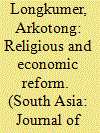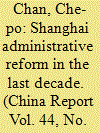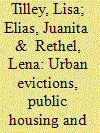|
|
|
Sort Order |
|
|
|
Items / Page
|
|
|
|
|
|
|
| Srl | Item |
| 1 |
ID:
080584


|
|
|
|
|
| Publication |
2007.
|
| Summary/Abstract |
The Heraka or Gaidinliu Movement among the Zeme Nagas of the North Cachar Hills, Assam, provides a case of millenarian activities based on agrarian reforms. The movement is associated with opposing British rule during the 1930s until India's Independence in 1947 under the guidance of Jadonang and later Gaidinliu. I examine the genesis of the movement which was based on agrarian reform by linking it with the influx of Kuki people and the effect of British land policy on Zeme agricultural practices which caused land shortages and famine. I argue that the Heraka Movement provided an alternative by abolishing certain rituals associated with the agricultural cycle and this in turn changed the social hierarchies and the worldview of the Zeme.
1 This paper was first presented at the 2006 European Conference of Modern South Asian Studies, organised by the European Association for South Asian Studies (EASAS) at Leiden University (Panel 28: Ethnicity and Development: Tribes and Small Peoples of India). I am grateful to Tahulung and Adeule for helping me understand the 'Zeme world'. I am thankful to Paul Streumer, Mohan Gautam, Lindsay Graham, Jeanne Openshaw, Amanda Bowden, Mark Turin, Steven Sutcliffe, Vibha Joshi and Erik de Maaker for their comments and feedback
|
|
|
|
|
|
|
|
|
|
|
|
|
|
|
|
| 2 |
ID:
090282


|
|
|
|
|
| Publication |
2008.
|
| Summary/Abstract |
Since the last decade, the Shanghai government has carried out administrative reforms towards the goals of rationalisation and marketisation. Various reform measures have been implemented, including, for example, segregation of government and enterprises (zheng qi fen kai); reduction of administrative examination and approval (jianshao xingzheng shenpi); and devolving some of the government functions to the third sector. Among various measures, probably the setting up of a new local government in the Pudong New Area is the most significant. After the examination of different aspects of the Shanghai administrative reforms, we conclude that the goal of the reform has been set correctly but without enough bold and innovative attempts. We suggest that further administrative reforms in Shanghai should be implemented with more rationalisation and marketisation in order to build up a true market economy without administrative interference from the government.
|
|
|
|
|
|
|
|
|
|
|
|
|
|
|
|
| 3 |
ID:
164716


|
|
|
|
|
| Summary/Abstract |
The dispossession of urban communities across class and racial lines is a global phenomenon linked to the expansion of international investment in the development of ‘exemplary’ city space. However, city evictions are also historically informed and gendered processes which are continuous with past colonial and postcolonial urban rationalisation projects. Drawing on testimonies of women evictees in Jakarta, as well as interviews with public housing managers, this article details the gendered nature of the rationalisation of urban life in the context of a contemporary evictions regime. We argue that the rationalisation of urban space serves to sharpen the gender order by placing material constraints on women's roles, limiting their economic activities and defining them as hygiene‐responsible housewives. Further, and in turn, the limited provision of ‘rusunawa’ public housing, which we show to be a gendered spatial and social transition informed by state doctrine on the family, provides the state with justification for dispossession itself. Finally, women's everyday acts of refusal and resistance show not only that kampung forms of social life continue to be preserved in Jakarta, but also that rationalisation itself is a negotiated and contingent process.
|
|
|
|
|
|
|
|
|
|
|
|
|
|
|
|
|
|
|
|
|